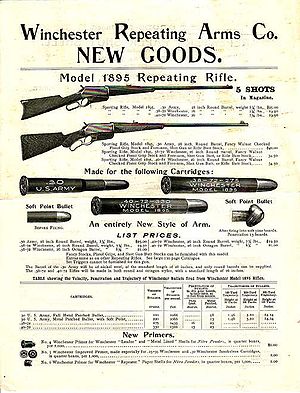Winchester 1895
| Winchester Model 1895 Repeating Rifle | |
|---|---|
 |
|
| Type | Lever-Action Rifle |
| Place of origin | United States |
| Service history | |
| Used by | See Users |
| Wars |
Spanish–American War Philippine–American War Mexican Revolution World War I Finnish Civil War Russian Civil War Polish–Soviet War Spanish Civil War World War II |
| Production history | |
| Designer | John Browning |
| Designed | 1895 |
| Manufacturer |
Winchester Repeating Arms Company Browning Arms Company |
| Produced | 1895–1940 (Original; Special Order 1936-40) 1984 (Browning; Limited Edition) 1995-Present (Winchester; Limited Editions) |
| No. built | About 425,000 |
| Variants | Rifle, Carbine |
| Specifications | |
| Weight | 4.2 kg (9.3 lb) |
| Length | 1,175 mm (46.3 in) |
| Barrel length | 710 mm (28 in) |
|
|
|
| Cartridge |
.30-40 Krag |
| Action | Lever-action |
| Feed system | 5, 4-Round Internal Magazine |
| Sights | Rear: Sliding Ramp Front: Fixed-Post |
.30-40 Krag
7.62×54mmR
.303 British
.30-03
.30-06 Springfield
.35 WCF
.38-72 WCF
.40-72 WCF
.405 Winchester
The Winchester Model 1895 is a lever-action repeating firearm developed and manufactured by the Winchester Repeating Arms Company in the late 19th century, chambered for a number of full-size military and hunting cartridges such as 7.62×54mmR, .303 British, .30-03, .30 Army, .30-06, .35 Winchester, .38-72 Winchester, .40-72 Winchester and .405 Winchester.
The Model 1895 was the first Winchester rifle to feature a box magazine located underneath the action instead of the tubular magazine design, which had remained fundamentally unchanged from the Winchester 1866. This allowed the rifle to safely chamber military and hunting cartridges with spitzer (pointed) bullets. The M1895 was also the last of the lever-action rifles to be designed by John Browning, and featured a rear locking bolt as in his previous designs dating back to the Winchester 1886. The M1895 is the strongest lever-action rifle Winchester has produced, designed to handle the increased pressures generated by the more powerful smokeless powder cartridges entering common use at the time of its introduction. By today’s standards however, the design is considered relatively weak, and not suited to high pressure loads.
...
Wikipedia
